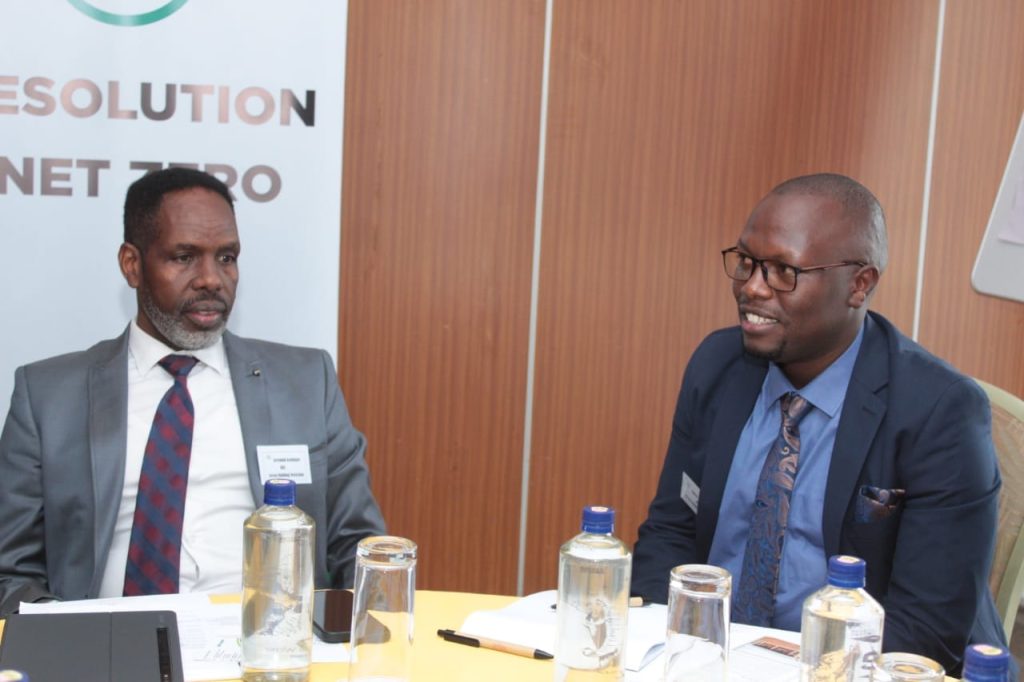Resolution Net Zero Is An Impact Organization That Offers Various Services On Matters Regarding Carbon Emissions And Climate Change.
In Line With The Sustainable Development Goals (SDGs), As Outlined In The Paris Agreement; Our Bespoke Services Help Organizations And Government Entities Embark On A Carbon-Neutral Journey. We also facilitate organizations to actively take part in climate-resilient initiatives.
Contact Us
- Africa Creative Centre, Karen Village, Ngong' Road. Nairobi, Kenya
- info@rnzafrica.org
- +254 703 285 760
Social Contact
Introduction and Background: About Resolution Net Zero (RNZ)
Resolution Net Zero (RNZ) is an impact organization that offers various services on matters regarding carbon emissions and climate change. In line with the Sustainable Development Goals (SDGs), as outlined in the Paris agreement; our bespoke services help organizations and government entities embark on a carbon-neutral journey. We also facilitate organizations to align with the ESG guidelines. We aim to play a catalytic role in supporting solutions that enhance resilience to climate change with a long-term vision of being the champion for Climate Action in Africa and beyond . Our key areas of service include;
1.NET ZERO CONSULTING
- Carbon audit: Incorporate modern technology to determine carbon footprints for an organization.
- Carbon-neutral strategy: We deploy our unmatched expertise to identify opportunities and develop a proper blueprint for achieving a carbon- neutral future.
- Capacity building: In appreciation of the need for governments and organizations to consciously engage in climate-resilient initiatives, we have developed a robust framework and tailor-made training programs to equip personnel with the necessary skills and build their capacity, so that they can steer climate action initiatives successfully.
2. GREEN PROJECTS
In partnership with governments, the public, and private organizations, we directly engage the public in undertaking several green projects that fall under the following categories;
- Afforestation & Reforestation: Spearhead planting of trees to achieve 30% forest cover in Kenya by 2030.
- Clean energy: Distribution of solar energy and clean cooking equipment •Carbon Farming: Regenerative farming techniques where farmers can store more carbon in their soil.
- Green Building: We help built environment stakeholders to ensure that the construction, occupancy, renovation, repurposing, and demolition of buildings meet the set green standards.
- Sustainable Tourism: Champion ecotourism in Kenya to minimize the effects of tourism on climate change.
- Green Projects Advocacy: Consistently create awareness of the need for climate action initiatives in all industries.
3. CARBON TRADING
Carbon project development
We work with landowners to generate carbon credits/offsets for the voluntary/non-compliance carbon markets.
Aggregation
RNZ seeks to close this gap by aiding the aggregation and certification of nature- based offsets, thus enabling the smallholder farmers to become micro holders of carbon offsets
RNZ in partnership with other organizations and government and relevant government departments, organized a green building workshop themed Defining the decarbonization roadmap for the built environment in Kenya. The workshop’s main objective was to identify the successes and challenges faced in greening the built environment in Kenya and to chart/ highlight possible solutions.
Below are the details of the workshop;

Theme: Defining the decarbonization roadmap for the built Environment in Kenya.
Date: Friday, 09 December 2022
Venue: Sarova Panafric
No of Participants: 45 – Physical Attendance and 87 Virtual attendance. This included people from different construction industry professions such as Architects, Quantity surveyors, Engineers, policymakers, etc. (Refer to Annex 1 for the attendance List)
Structure of presentations: We had individual presentations as well as a panel discussion. (Refer to Annex 2 for the Agenda).
The workshop began with the opening remarks from Mr. Edwin Some, the CEO of RNZ who highlighted the need to disrupt conventionality for sustainability, across the value chain in the building industry.
Below are the highlights of the presentations made in the morning;
Seeta Shah, Senior Affordable Housing Specialist, Financial Sector Deepening Kenya (FSD Kenya)
She explained the role and approach of FSD Kenya in greening the built environment.
Key points
- There are many Laws, Statutes, and Regulations along the housing value chain (140 of them). This raises the need for intervention to make the regulatory environment support housing.
- The need for a one-stop shop for approvals to enable the delivery of affordable housing.
Cecilia Wandiga, Executive director, Centre for Science and Technology Innovations (CSTI). CSTI support science-driven environmental initiatives to stimulate the development of new technologies, promote sustainable business innovations and enable community-led growth across Africa.
Topic: Circular Materials in Building Construction.
Key points
- The scope of the greening of buildings, goes beyond design, to touch on the source of emissions, which comprise human activities, and waste management.
- The population is ever-growing and yet space remains constant.
- The need to incorporate information technology. For example, the automation of switches, and a modeling tool known as digital twin modeling, which is used to project the cost of retrofitting a number of buildings, and whether it is worth the effort.
- The opportunity for waste recycling in the agricultural sector. For example, rice husk waste (one of the biggest environmental pollutants in the world), can be used to make an MDF board. Some companies use banana waste as bio-fortified flour mixtures.
- Buildings can be material banks (highly embraced in the UK). Demolition should be done carefully to maximize the reuse of materials where possible.
- Need to change the sustainable waste management act into a strategy.
- The need for a regulatory sandbox to allow innovation.
- Importance of having housing data inform policymaking.
Challenge (s) facing transition.
Manufacturers find it too expensive to switch the production line. For example, most bio- based plastics will destroy a regular machine.
Important questions.
- Who provides training to transition in manufacturing?
- How do they get compensated for the losses that arise from the transition?
Below are the highlights of the presentations made in the afternoon.
Wahome Ngugi, Sustainable building Services Engineering, Trium Limited .
Trium ltd consists of building design & construction consultants, they offer a comprehensive range of integrated environmental and engineering solutions for the built environment. Topic; Why Green design? In his presentation, he highlighted the merits of green buildings to be: lower operating costs (15% – 20%), increased property value (4% – 20%) ; Enhanced marketability (Green Buildings sell/lease x4 faster), reduced liability and risk (GB have 30% lower default rate), responsible investing, increased productivity, attracting and retaining talent and combat climate change (+20% savings in GHG emissions).
He identified green building strategies to be;
- Use of sustainable building materials in construction.
- High-performance building modeling to analyze and reduce CO2 emissions.
- Water saving measures e.g. water efficient fixtures, water recycling, rainwater harvesting
- Energy saving measures e.g. use of LED lighting, and Energy Star-rated appliances.
- Incorporation of waste management practices for both the construction and operational phases.
- Building Management systems and functioning requirement levels for each specific sub- development.
He also emphasized the use of EDGE (“Excellence in Design for Greater Efficiencies”) as it makes it easy to design and certify resource-efficient and zero-carbon buildings.
Below are the highlights of the presentations made in the afternoon.
Eliud Barno, Partner, BACE Partners LLP
Topic; Tax Incentives for Green Buildings
BACE Partners is a professional service firm focused on providing audit and assurance, advisory, and tax services.
He explained that in Kenya, tax incentives are meant to reduce the tax payable by qualifying companies thus providing such entities with extra cash to grow their businesses and make them competitive.
He highlighted the following tax incentives for the construction industry;
1. Available Tax Incentives for Real Estate in Kenya
- Hotel buildings (50%), Buildings used for manufacturing (50%), Hospital buildings (50%), and Educational and Commercial buildings (10% per annum)
- The allowance of 50% is claimed in the first year and a residual 25% per annum
- Where the capital expenditure is incurred on the construction of the buildings above and before that building is used it is sold, the seller shall not be allowed a deduction.
- Most real estate developers in Kenya are therefore not eligible to claim investment allowances when they develop and sale
2. Available Tax Incentives for Renewable Energy in Kenya
a) Corporate Income Tax
An investment allowance at 50% is given in the first year of use and 25% per year on the residual value. This applies to the equipment used for the transformation and distribution of electricity. Interest income from listed bonds, notes, or other similar securities used to raise funds for infrastructure, projects, and assets defined under Green Bonds Standards and Guidelines, and other social services
b) Value Added Tax (VAT)
Inputs or raw materials supplied to solar equipment manufacturers for the manufacture of solar equipment or deep cycle-sealed batteries which exclusively use or store solar power.
This has to be approved by the Cabinet Secretary for the National Treasury, upon recommendation by the Cabinet Secretary responsible for energy and petroleum.
c) Customs and Excise Tax
- Inputs or raw materials supplied to solar equipment manufacturers for the manufacture of solar equipment or deep cycle-sealed batteries which exclusively use or store solar power.
- This has to be approved by the Cabinet Secretary for the National Treasury, upon recommendation by the Cabinet Secretary responsible for energy and petroleum.
3. How tax incentives can be extended to include green buildings in Kenya
a) VAT exemptions/reductions – In China, under the green building sector, VAT exemptions are given for selling self-manufactured products with no less than 30 percent of waste residues in raw materials; an immediate rebate for selling self-manufactured recycled asphalt concrete produced from waste asphalt concrete; and immediate rebate (50 percent) on the selling of self-manufactured environmentally-friendly new walling materials
b) Investment allowance on the purchase of any special-purpose equipment used in green buildings
c) Energy-saving Income earned by qualified energy-saving service companies engaging in energy management contracting projects is temporarily exempted from business tax. Such companies are also eligible for the CIT three-year exemption + three-year half reduction
d) Accelerated Investment allowances on equipment and buildings-100%?
e) Energy level produced incentives- Rebates for energy produced
f) Significant import duty reductions g) Research and development costs
h) Tax holidays
The panel discussion was moderated by Anne Mwangi, Lead consultant for green building at RNZ.. The following are the areas tackled and the key highlights by each panelist.
Eng. Stephen Nyakondo, Ag.Manager, Construction Research and Business Development NCA(Represented the CEO who was attending a board meeting)
National Construction Authority(NCA) is mandated by law to accredit and register contractors and regulate their professional undertakings. It, therefore, regulates, streamlines, and builds capacity in the construction industry. Given its mandate, NCA is one of the key institutions that can play a critical role in the advocacy and implementation of green building-related policies in Kenya.
Questions tackled by Eng. Stephen: We sought to understand NCA’s role in advocacy for green building as well as policies or standards in place to guide the Country towards decarbonization of the built environment. In addition, the panelist was asked to comment on the finalization of the review and the enactment of the National Building Code 2022 and the document’s role in supporting decarbonization. Eng. Stephen highlighted;
- The regulatory role of NCA and how it contributes to greening the built environment, and the policies that have been put in place to aid the greening of the construction industry.
- The building code has never been reviewed since 1968 and was not adopted in the 2010 constitution. NCA is however working on its adoption.
- Players in the industry have come up with a document called the construction industry policy, to address disharmony caused by too many regulatory bodies.
- Working on a policy to enable inspection of materials after demolition, to facilitate reuse.
- NCA recently adopted a document to address excavation.
- NCA has taken up the role of capacity building for contractors.
Azmeena Bhanji, Vice Chairperson, Kenya Green building Society (KGBS)
KGBS is an independent, non-profit membership-based society registered with the World – Green Building Council.
Questions tackled by Azmeena: We sought to understand the role of KGBS in decarbonizing the built environment as well as some of the opportunities Kenya as a country has to fast-track the adoption of green buildings. She highlighted;
The role of KGBS in decarbonizing the built environment, including Green building guidelines for counties in collaboration with FSD Kenya.
The roadmap for decarbonizing the built environment, while taking into account Kenya’s NDCs.
EDGE training and ESG reporting.
Shortage of green building professionals in Kenya and the need to have more experts trained
continuously, given the evolving nature of technology.
Hon. Gloria Orwoba, Senator (Member of the delegated legislation committee and ICT) She highlighted;
- The role of the senate in legislating and policy formulation for sustainability.
- The senate plays a big role to support the oversight authorities to implement existing policies and enforce regulations, especially around waste management.
- Plan of the national government on climate change and resilience
- The need to sensitize government entities on matters of climate change. Extended Producer Responsibility (EPR)She highlighted that only 28% of plastics in Kenya are recycled and the need
Evans Kituyi Ph.D. Principal consultant, climate change and resilience, RNZ Questions tackled by Dr. Evans; Expounded on why, and how, to decarbonize the built environment, with emphasis on green infrastructure.
He highlighted that;
- According to world bank statistics, the number of cities in Africa has risen from 3,000 to about 7,200 over the last 30 years.
- The 4th UNEA (United Nations Environment Assembly) session identified that infrastructure is heavily responsible for climate change and natural resource loss.
- Construction-related activities disrupt biodiversity
Catherine Khasoa, Lead for Public Relations and Media Liaison, Optiven
Optiven is a renowned real estate company in Kenya. It has strategic business units in real estate, construction, insurance, and home.
Questions tackled by Catherine; Describe the interconnection between land ownership and building green and guidelines administered after selling land parcels to ensure landowners build green.
She highlighted;
The internal green policy adopted by Optiven and how Optiven Homes (the construction arm of Optiven ltd), is guided by these policies when constructing for clients.
The need for the Government of Kenya to introduce incentives, in form of tax rebates, to cushion developers against losses incurred by embracing sustainability.
Grace Kiroko, General Manager, Makiga engineering
Makiga Engineering service ltd is committed to offering low-cost, eco-friendly, and durable construction using appropriate building technologies. They also do provide training constructors on how to make and build using the Makiga building blocks.
Questions tackled by Grace; The comparison between Makiga blocks and other ordinary alternatives, in terms of cost, reliability, and sustainability.
She highlighted and demonstrated that;
Makiga blocks are made of 95% soil and only 5% cement.
Demonstrated the use of Makiga blocks and their efficiency in terms of value and sustainability aspect.
RNZ
Wangari Maathai
"We owe it to ourselves and to the next generation to conserve the environment so that we can bequeath our children a sustainable world that benefits all."
Rabindranath Tagore
"Trees are the earth's endless effort to speak to the listening heaven."
Lady Bird Johnson
“The environment is where we all meet; where we all have a mutual interest; it is the one thing all of us share.”
Richard Rogers
"The only way forward, if we are going to improve the quality of the environment, is to get everybody involved."




Contact Us
- Africa Creative Centre, Karen Village, Ngong' Road. Nairobi, Kenya
- +254 703 285 760
- hallo@rnzafrica.org
© Copyright 2024 Resolution Net Zero All Rights Reserved